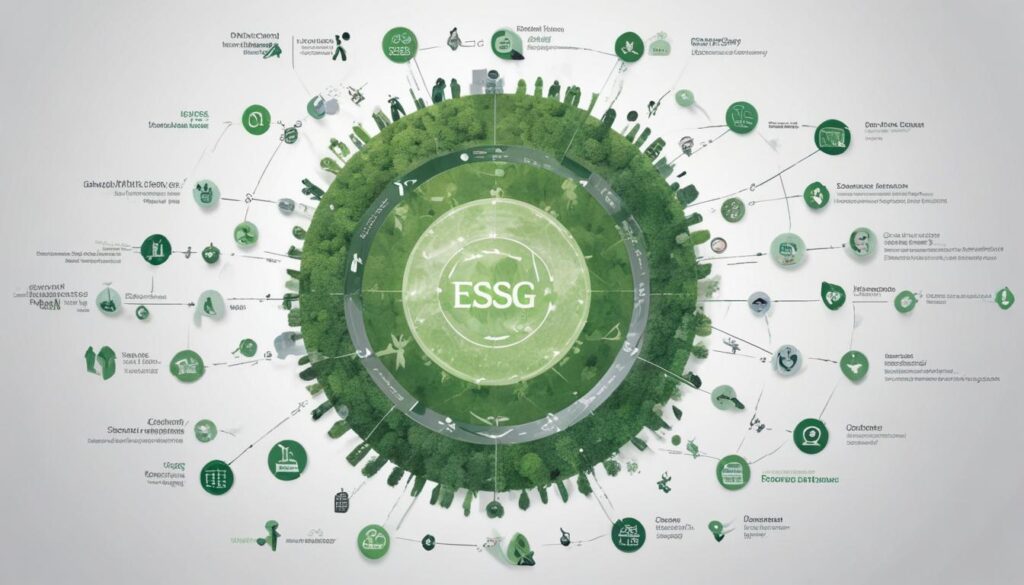ESG reporting is a structured process where organizations disclose their environmental, social, and governance performance to enhance transparency, build stakeholder trust, address sustainability challenges, and comply with evolving regulations.
ESG Reporting is becoming a vital tool for businesses aiming to showcase their commitment to sustainability. Ever wondered how a well-prepared report can enhance trust and credibility with stakeholders?
Understanding ESG reporting principles
Understanding ESG reporting principles is essential for organizations committed to sustainable practices. These principles are designed to help companies evaluate their performance on environmental, social, and governance factors. A strong ESG report provides stakeholders with insights into how a company manages risks and opportunities related to these critical areas.
Key principles of ESG reporting include:
- Transparency: Companies should share accurate information about their practices and performance.
- Accountability: It’s important for organizations to take responsibility for their impact on stakeholders.
- Stakeholder Engagement: Engaging with stakeholders ensures that their concerns and interests are considered in the company’s practices.
- Consistency: Reports should maintain consistent metrics over time for comparability.
- Materiality: Focus on issues that are significant to both the business and its stakeholders.
Following these principles not only enhances the credibility of the ESG report but also improves trust among stakeholders. Companies that embrace ESG reporting show a commitment to ethical conduct and sustainable growth. In today’s market, being proactive about ESG factors can create a competitive advantage, attracting investors and customers who prioritize sustainability.
The importance of sustainability reports

The importance of sustainability reports cannot be overstated in today’s business environment. These documents serve as a critical tool for companies to communicate their commitment to environmental and social responsibility. By providing a transparent overview of their operations and performance, organizations can foster trust among stakeholders and attract new investments.
Key benefits of sustainability reports include:
- Enhancing Trust: By openly sharing sustainability efforts, businesses build credibility with customers, investors, and the community.
- Managing Risks: Regular reporting helps identify potential risks related to environmental issues and social concerns, allowing for proactive management.
- Driving Improvement: Analyzing data from sustainability reports leads to improved practices and innovations, ultimately boosting efficiency.
- Regulatory Compliance: Many countries are implementing stricter regulations regarding corporate sustainability, making these reports essential for compliance.
- Attracting Talent: Companies with strong sustainability practices often attract employees who value corporate responsibility.
Ultimately, sustainability reports are not just about compliance; they represent a company’s dedication to improving its impact on the world. Embracing this practice can lead to long-term success and competitive advantages in the marketplace.
Steps for preparing a sustainability report
Preparing a sustainability report involves several critical steps that help organizations effectively communicate their environmental, social, and governance (ESG) efforts. Following a structured approach ensures that the report is comprehensive and meets stakeholders’ expectations.
The main steps include:
- Define the Purpose: Clearly outline the objectives of the report and what stakeholders need to know.
- Identify Relevant Metrics: Select key performance indicators (KPIs) that align with the organization’s goals and stakeholder interests.
- Collect Data: Gather quantitative and qualitative data from various departments to ensure accuracy and completeness.
- Engage Stakeholders: Involve employees, customers, and other stakeholders in the reporting process for feedback and insights.
- Draft the Report: Develop a clear and structured draft that follows established guidelines for sustainability reporting, ensuring transparency and comprehensiveness.
- Review and Revise: Conduct a thorough review of the draft, making necessary revisions based on feedback and data accuracy.
- Finalize and Publish: After approval, publish the report in accessible formats and promote it to reach a wider audience.
By meticulously following these steps, organizations can create impactful sustainability reports that not only inform but also inspire trust and engagement among their stakeholders.
Best practices for effective ESG communication

Implementing best practices for effective ESG communication is crucial for companies aiming to enhance their transparency and engage stakeholders effectively. A clear communication strategy not only informs but also builds trust with various audiences.
Key practices include:
- Be Clear and Concise: Avoid jargon and use straightforward language to ensure the message is easily understood.
- Use Data Effectively: Present relevant data using visual aids like graphs and charts to make complex information more digestible.
- Engage Stakeholders: Actively involve stakeholders in the communication process to gain insights and encourage feedback.
- Tailor Messages: Customize communications for different audiences, such as investors, customers, and employees, recognizing their unique interests and concerns.
- Leverage Multiple Channels: Utilize various platforms—websites, social media, and reports—to reach broader audiences and ensure messages are consistent.
- Monitor and Respond: Regularly track responses to ESG communications and be prepared to address questions or criticisms promptly.
By adhering to these best practices, companies can enhance their ESG communication efforts, fostering a culture of accountability and trust that ultimately benefits their reputation and bottom line.
Common challenges in ESG reporting
Common challenges in ESG reporting can hinder a company’s ability to communicate its sustainability efforts effectively. Addressing these challenges is crucial for producing credible and impactful reports.
Key obstacles include:
- Data Collection: Gathering accurate and comprehensive data across various departments is often difficult, impacting the quality of the report.
- Lack of Standards: The absence of universal reporting standards can lead to inconsistencies, making it challenging for stakeholders to compare reports.
- Resource Constraints: Many organizations struggle with limited resources, such as personnel and budget, which can impede the reporting process.
- Stakeholder Engagement: Failing to engage key stakeholders can result in misinformation or a lack of trust in the report’s findings.
- Changing Regulations: Keeping up with evolving regulations and compliance issues can be daunting, requiring constant updates to the reporting process.
To mitigate these challenges, it is essential for organizations to invest in training and resources that enhance data management processes. Additionally, adopting best practices and frameworks can streamline reporting efforts and improve the overall quality of ESG communications.
Future trends in ESG reporting

Future trends in ESG reporting are emerging as companies navigate the evolving landscape of sustainability and corporate responsibility. As investors and consumers increasingly prioritize environmental, social, and governance factors, organizations must adapt to meet these expectations.
Key trends include:
- Increased Standardization: The push for standardized reporting frameworks will help streamline ESG disclosures, making it easier for stakeholders to compare data across companies.
- Emphasis on Real-time Reporting: Companies are moving towards real-time data sharing, enhancing transparency and allowing for timely adjustments in sustainability practices.
- Integration of Technology: Advanced technologies, such as artificial intelligence and blockchain, will facilitate better data collection, analysis, and verification, making reporting more efficient and reliable.
- Broader Stakeholder Engagement: Organizations will focus on engaging a wider range of stakeholders, including employees and local communities, to gain comprehensive insights and improve their ESG strategies.
- Focus on Impact Measurement: Companies will increasingly measure and report on their actual impacts rather than just outputs, highlighting their contributions to sustainability goals.
By embracing these trends, organizations can enhance their ESG reporting practices, ultimately fostering trust and loyalty among stakeholders while contributing to a more sustainable future.
In conclusion, understanding ESG reporting is essential for modern businesses
As companies face increasing pressure from investors, customers, and regulators to act responsibly, effective ESG reporting becomes a vital tool for transparency and accountability.
By adopting best practices, recognizing common challenges, and staying informed about future trends, organizations can enhance their sustainability efforts and build trust with their stakeholders.
The path to successful ESG reporting involves clear communication, accurate data collection, and engagement with all relevant parties. Ultimately, committing to these practices not only benefits the company but also contributes to a sustainable future for everyone.
Frequently Asked Questions
What is ESG reporting?
ESG reporting is a process where companies disclose their environmental, social, and governance performance to communicate their sustainability efforts to stakeholders.
Why is sustainability reporting important for businesses?
Sustainability reporting enhances transparency, builds trust with stakeholders, and helps companies manage risks and opportunities related to their ESG initiatives.
What are some common challenges in ESG reporting?
Common challenges include data collection difficulties, lack of standardized reporting frameworks, resource constraints, and keeping up with changing regulations.
What best practices can improve ESG communication?
Best practices include being clear and concise, engaging stakeholders, using effective data visualization, and leveraging multiple communication channels.
What future trends can we expect in ESG reporting?
Future trends include increased standardization, real-time reporting, integration of technology like AI, broader stakeholder engagement, and a focus on measuring actual impacts.
How can companies overcome challenges in ESG reporting?
Companies can invest in training, improve data management processes, adopt best practices, and utilize technology to streamline their reporting efforts.


